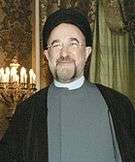Mohammad-Ali Najafi
Mohammad-Ali Najafi (Persian: محمدعلی نجفی; born 13 January 1952) is an Iranian university professor in mathematics and politician who held cabinet portfolios during the 1990s and 2010s.
Early life and education
Najafi was born in Tehran on 13 January 1952.[1] He ranked first in Iranian national university entrance exam and enrolled in Sharif University of Technology (then known as Aryamehr University of Technology).[2] He earned a bachelor of science degree in mathematics from the Sharif University of Technology. Following his bachelors, he enrolled in the graduate program at the Massachusetts Institute of Technology. He received his master of science degree in mathematics in 1976 but dropped out of PhD program in 1978 during the Iranian revolution to return to Iran.[3][4]
Career
Following the Iranian revolution of 1979, Najafi returned to Iran and became a faculty member at Isfahan University of Technology in 1979 and he was the chair of the university from 1980 to 1981. He was a faculty member at department of mathematical sciences in Sharif University of Technology from 1984 to 1988, when he moved to government.
At the end of the reformist government of Mohammad Khatami and following Mahmud Ahmadinejad's election Najafi moved back to university and has been faculty in the department of mathematics at Sharif University of Technology[5] working on representation theory.[4]
He served as an advisor to Mostafa Chamran.[5] He was the minister of higher education from 1981 to 1984 in the cabinet of then Prime Minister Mir-Hossein Mousavi.[4][5] In 1989, he became the minister of education under then President Hashemi Rafsanjani and served until 1997.[4][5] In 1997, he was appointed vice president and head of the Planning and Budget Organization by President Mohammad Khatami, but after a merge of the organization with another he was succeeded by Mohammad Reza Aref in the post. Najafi was an advisor to President Khatami and the senior advisor to the minister of industries from 2001 to 2005.[5] In the Iranian City and Village Councils elections, 2006, Najafi ran for a seat in Tehran City Council. He headed a list named "The Union of reformists" (ائتلاف اصلاحطلبان). This was the first time Najafi ran in a general election in Iran. He was not seek for a reelection in 2013 election. He was also advisor to Mahdi Karroubi.[6] He is the cofounder of the Executives of Construction Party.[7]
He was nominated as minister of education by Hassan Rouhani. However, the Parliament did not approve his appointment on 15 August 2013.[8] He received 142 votes in favor, 133 votes against, and 9 abstentions.[6] He was appointed head of Cultural Heritage, Handcrafts and Tourism Organization on 17 August.[9] However, Najafi resigned from his position on 30 January 2014 due to health problems, making it the first change in Rouhani's cabinet.[10]
References
- ↑ "Joint Crisis: Supreme Defense Council of Iran, 1980" (PDF). Harvard Model United Nations. Retrieved 3 October 2013.
- ↑ "نجفی رئیس سازمان میراث فرهنگی و". Fars News.
- ↑ Mohammad Ghouchani (26 November 2006). "Why Najavi? (چرا نجفی؟)" (in Persian). Retrieved 17 December 2006.
- 1 2 3 4 "Faculty". Website of the Department of Mathematical Science of Sharif University of Technology. Retrieved 17 December 2006.
- 1 2 3 4 5 Paper publicity leaflet distributed by Setād-e Entexābāti-e Mohammad Ali Najafi (ستاد انتخاباتی محمدعلی نجفی), December 2006.
- 1 2 Karami, Arash (15 August 2013). "Three Rouhani Cabinet Nominees Rejected". Al Monitor. Retrieved 19 August 2013.
Mohammad Ali Najafi, nominated for education minister, was regularly attacked for his position on the 2009 election protests and for being a senior adviser to Mehdi Karroubi, the Reformist candidate who is currently under house arrest for contesting the results of the 2009 elections. ... In order for a nominee to be approved, he needs to receive at least half plus one of the 290 total votes.
- ↑ "Iran politics: Rowhani takes a centre line in his cabinet nominees". ViewsWire. 8 August 2013. Retrieved 29 August 2013.
- ↑ "Three ministerial nominees fail to win Iran Majlis confidence vote". PressTV. 15 August 2013. Retrieved 15 August 2013.
- ↑ "Rowhani names Fani as caretaker of education ministry". Jamejam Online. 18 August 2013. Retrieved 13 October 2013.
- ↑ "Rouhani accepts Najafi's resignation".
![]() Media related to Mohammad-Ali Najafi at Wikimedia Commons
Media related to Mohammad-Ali Najafi at Wikimedia Commons
| Academic offices | ||
|---|---|---|
| Preceded by Seied Hossein Taheri |
Chancellor of the Isfahan University of Technology 1980–1981 |
Succeeded by Mohammad Mehdi Saadatpour |
| Political offices | ||
| Preceded by Position established |
Minister of Science and Technology 1981–1984 |
Succeeded by Mohammad Farhadi |
| Preceded by Kazem Akrami |
Minister of Education 1989–1997 |
Succeeded by Hossein Mozaffar |
| Preceded by Hamid Mirzadeh |
Head of Management and Planning Organization 1997–2000 |
Succeeded by Mohammad-Reza Aref |
| Preceded by Mohammed Sharif Malekzadeh |
Head of Cultural Heritage and Tourism Organization 2013–2014 |
Succeeded by Mohammad Beheshti Acting |
| Preceded by Reza Farajidana |
Minister of Science and Technology 2014 |
Succeeded by Mohammad Farhadi |



